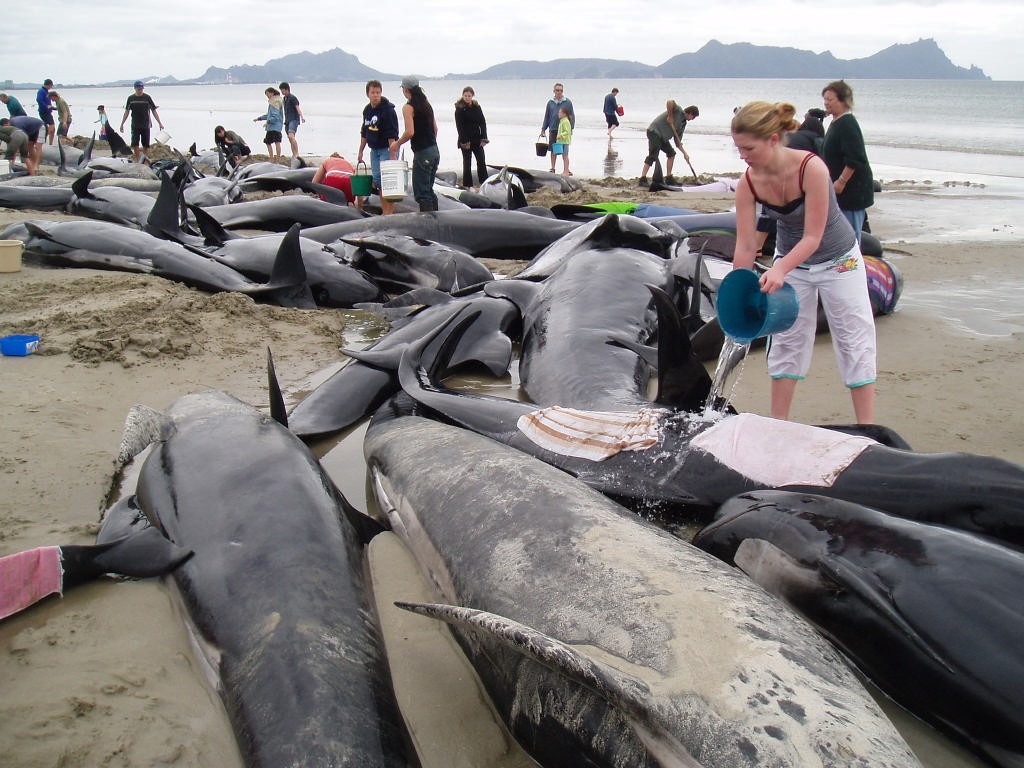Whale stranding brings out the best in humans
by Jane Pares, International Marine Brokers on 15 Nov 2006

Whale stranding Uretiti Beach, November 2006 Jane Pares
New Zealander Jane Pares was on her way to the Bay of Islands, over the weekend to help solo sailor, Donna Lange, when she got involved in the pilot whale stranding at Uretiti Beach. Her's her story and photos:
As soon as we got onto the beach we could see a moving crowd of people gathered round the pod of stranded pilot whales on Uretiti Beach, south of Whangarei Heads. Nearly fifty of them had beached themselves on a falling tide, early on Saturday morning (11th Nov) and were now struggling to survive high up on the beach. I was en route to the Bay of Islands and had pulled into the campground to visit friend in their house bus. As I drove up to their home on wheels, Sally and Harry came running up carrying buckets and a shovel, 'Quick Jane, you’ve got to come and help us save the whales.'
Drawing closer we saw people scurrying down to the sea, scooping up buckets of water, dashing back up, pouring it over the piles of inert, black whale bodies lying on the sand and then returning over and over again. Many of the heavy, dark forms were draped with colourful towels and sheets which had to be kept damp to protect their delicate skin from drying out. Dead and alive whales lay side by side. Their breathing was laboured and their eyes tight shut.
Three hours till high tide. Grabbing buckets we joined the team. Although DOC expertise was co-ordinating the overall effort, it was wonderful to see how everyone naturally fell into harmonious teamwork. Random teams formed round individual whales keeping them wet, small children with beach buckets scooped and poured, a lady with her baby in a backpack was in the thick of it, while teams of strong men moved through the groups responding to cries of, 'We need help over here to lift this whale onto its stomach.' Their stress was evident from the laboured breathing, tail thrashing, groans and the puddles of green whale pooh.
As the tide started to swirl around our feet the activity intensified. It was imperative to get them onto their fronts and their blow holes out of the water so they didn’t drown. Rolling 4.5m and three tons of living whale takes the strength of at least 8 strong men! Scooping out the sand by their flippers, we made indents for them to fit into once on their stomachs. With the water lapping round their bodies, they started to get more active, lifting their heads and thrashing their tails. Our task was to keep them upright and facing out to sea.
As the tide slowly surrounded each whale and its team of helpers and we struggled to hold them from swimming away. Project Jonah workers arrived and inflated floating pontoons on which to tow the ‘lead whale’ out to sea: the idea being that it would draw the pod away from the beach where the dead ones still lay in the shallows. The pod is a tight family unit and they want to return up the beach to search for the lost / dead ones who aren’t responding to their calls. It was also necessary to hold them back until the tide turned, so even though we were in the water for nearly two hours, nobody wanted to leave until ‘their’ whale swam free.
Once the ‘lead whale’ was in position, the signal was given to let them go. We pushed ours forward and watched anxiously as it rolled slightly to one side. Many of them were confused after being on land and they took a while to orientate themselves - rolling onto their backs and sides as we let go. Swimming round in a tight group they took a while to get their bearings before finally heading out to sea. We all linked arms and formed a human wall to prevent them from heading back up the beach. The care and concern of everyone involved was wonderful to see. You see, humans can pull together as a team, but it often takes a crisis to bring out the best in us.
DOC handled the rescue effort very professionally. Using a loud haler they kept us informed us of what was happening while DOC workers moved through the groups praising our efforts, pointing out safety issues and telling us how the whales would react as the tide came in.
New Zealand is at the forefront of whale rescue work and since 1840 more than 5000 strandings of whales and dolphins have been recorded around the coast.
If you want to link to this article then please use this URL: www.sail-world.com/28802